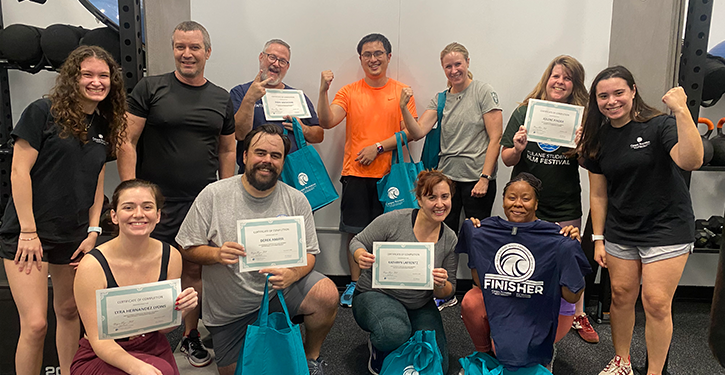New faculty and staff small group training sessions at Tulane University benefits community and Campus Rec department.
At Tulane University, a new faculty and staff small group training program is reshaping how faculty and staff engage with Campus Recreation. What started as a pilot program in summer 2024 has quickly grown into a valuable offering that provides employees with a structured, accountability-based fitness option.
Designed to bridge the gap between Tulane’s Employee Health Improvement Program (EHIP) and long-term wellness, the faculty and staff small group training program ensures employees have a dedicated space to continue their fitness journey. Unlike EHIP, which is a one-time, eight-week program funded by Human Resources, this initiative gives faculty and staff an ongoing option to maintain their progress in a supportive group setting.
For Megan Byas-Hill, the assistant director of Fitness and Wellness at Tulane, the program is about more than just fitness. “When we as faculty and staff pour into ourselves, it pours into the students,” she said. “I feel it also increases feelings of belonging to this university. Having intentional programs for faculty and staff and marketing and creating spaces for them lets them know we care about their health and well-being. They matter on this campus as well.”
Breaking Down Barriers
Because campus recreation doesn’t often provide faculty/staff-centric programming, Tulane’s small group training was designed to address multiple barriers and concerns.
While many faculty and staff were interested in continuing their fitness journey post-EHIP, some struggled with accountability or felt out of place working alongside students. Small group training provides a comfortable, structured environment, ensuring employees have a space that fits their needs.
“It’s a way for faculty and staff who are already visit the gym or are looking for ways to get involved to have a space and dedicated class,” explained Byas-Hill. “These opportunities will be there for them to work out with each other and not be mixed in with students which some people don’t like.”
Another major factor was affordability. With Tulane no longer offering community memberships post-COVID-19 pandemic, increasing faculty and staff engagement became even more important for Campus Recreation. “This is another way for us to target a potential membership audience,” said Byas-Hill. “We could increase revenue and bring in more opportunities to keep making the gym accessible to only Tulane affiliates.”
As the program has expanded, so has the demand. Faculty and staff have embraced the opportunity to train in a supportive environment, driving steady participation growth each semester.
Keeping Audience Needs in Mind
To continue growing interest and participation in faculty and staff small group training sessions, Byas-Hill had to consider the unique needs of participants when planning these ideas.
The program offers three sessions — morning, noon and evening — with enrollment numbers reaching as high as 25 participants per session. While morning sessions have seen lower participation, Byas Hill is optimistic about future growth, particularly during summer when employees have more flexibility.
“With campus rec being a powerhouse on many campuses, it’s important to foster community for everyone at the university,” said Byas-Hill. “If you’re able to dedicate a few classes or opportunities for faculty and staff, they’ll start being advocates and promoters for the department because they see the value of campus rec for the entire community.”










